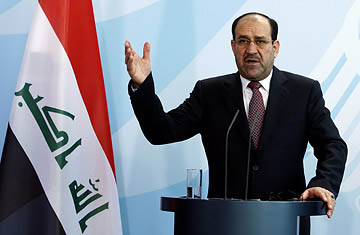
Iraqi Prime Minister Nouri al-Maliki
Appearing alongside Secretary of State Condoleezza Rice in Baghdad on Thursday, Iraqi Foreign Minister Hoshyar Zebari made a point of highlighting concessions made to his government by the U.S. "The U.S. negotiators indeed show a great deal of flexibility and understanding," said Zebari, who described the latest developments in protracted talks over the future status of American forces in Iraq.
Zebari and Rice both acknowledged that the security agreement they're pursuing would include a timetable for the withdrawal of U.S. troops, which was demanded by the government of Prime Minister Nouri al-Maliki but initially resisted by Washington. In what may be another reluctant U.S. concession to al-Maliki, Iraqi officials say the current draft agreement strips the immunity given to private security contractors working with the U.S. military and diplomatic staff. Rice said Thursday that the U.S. side considers the pending deal acceptable, effectively leaving final approval to the Iraqi government and the parliament, which must ratify the pact after review by the Prime Minister. But al-Maliki appears to be pressing for more on the question of whether U.S. troops remaining in Iraq would enjoy the same immunity from prosecution that they have in other host countries. Also, it remains uncertain under the new agreement whether U.S. forces would retain the right to arrest and detain Iraqi nationals.
Zebari said the draft agreement would undergo review by a special executive council in the weeks ahead. But the final decision on approving the deal rests with al-Maliki, a Prime Minister who has become increasingly assertive of his independence from Washington as his stature has grown in Baghdad and abroad.
Until this year, the Bush Administration had appeared to take for granted al-Maliki's acquiescence when push came to shove. The Iraqi Prime Minister had, for example, publicly opposed the surge of some 30,000 additional U.S. troops deployed in Iraq last year, but when they came anyway, al-Maliki's government muffled its dissent. That left many in the region and beyond questioning the extent of sovereign control exercised by the Iraqi government.
Things have changed in recent months, however, with al-Maliki steadily strengthening his own political footing. Through a series of battles earlier this year, the improved Iraqi security forces nearly managed to marginalize the Mahdi Army militia of powerful Shi'ite cleric Muqtada al-Sadr, the Prime Minister's chief rival. Moreover, the Iraqi army has shown new muscle in Sunni areas of Iraq like Diyala province, even as the Prime Minister shored up Sunni support for his government in Baghdad — a delicate political process involving force and cajoling but little compromise on his part.
As his powers at home grew, al-Maliki looked to expand his international Rolodex beyond his longtime backers in Tehran. In July, the Iraqi leader flew to Europe for appearances in Germany and Italy and at the European Union headquarters in Brussels — all haunts of Bush Administration "frenemies" over Iraq. Talk of Iraq's potential ability to increase oil and gas exports to Europe was high on the agenda during the tour. And earlier this month, al-Maliki's government announced plans to revive a $1.2 billion oil deal with China that had first been inked in 1997 under Saddam Hussein but was nixed after the U.S. invasion. The deal, if completed, would represent a notable snub by al-Maliki toward Washington, which has so far failed to get the Iraqis to pass an oil law that would open the way for U.S. and other international oil companies to gain lucrative contracts in Iraq.
Despite Zebari's confidence, the extent to which al-Maliki will manage to roll back the Bush Administration on the security deal remains unclear. Both Rice and Zebari say a final agreement is close, and each side seems eager to finalize the agreement before the current U.N. mandate for the presence of U.S. troops in Iraq expires at the end of 2008. Still, among the various parties to the talks, al-Maliki now appears to be the one controlling the clock.
— With reporting by Mazin Ezzat / Baghdad
